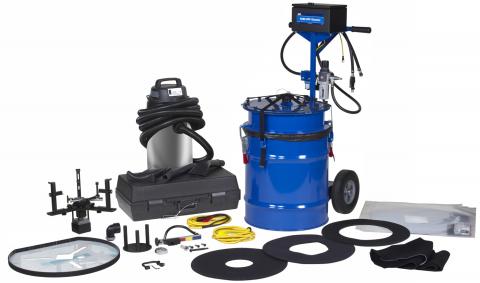They say cleanliness is next to godliness, but even more important is that cleanliness keeps a truck performing as it was intended. In 2007, heavy duty truck manufacturers were required to include diesel particulate filters (DPF) on new trucks to reduce particulate matter emissions that create the familiar black smoke and to comply with government regulations.
What that means to you, as a driver, fleet manager, shop owner or technician is another service and maintenance point on commercial vehicles. Checking or cleaning a DPF should become part of regular Periodic Maintenance.
The benefits of keeping these filters clean extend to engine performance and longevity while keeping with emissions standards. A clogged filter can cause excessive back-pressure in the exhaust system. Once the filter is plugged beyond a certain point the vehicle’s on-board computers derate the engine which leads to a loss of power and fuel economy. If these symptoms are ignored, continuing to drive with a plugged DPF could eventually lead to a downed truck and the need for a new DPF that may cost thousands of dollars to go along with the frustration of not meeting deadlines.
As a driver, you should be aware of your truck’s recommended intervals for cleaning the DPF and when it is needed. Cleaning the DPF in a DPF cleaning machine while performing other service allows you to get back on the road with minimal additional downtime.
For shop owners and fleet managers, the added service point potentially means business opportunities. Does your shop have a DPF cleaner? While the equipment cost may seem high, if you’re one of the few shops in the area with a cleaner, you can charge money to clean others’ DPF’s on the side to make your money back and eventually start to profit. You save money by not sending filters out to be cleaned while and make additional money by maximizing the machine’s use.
At a price of several hundred dollars per DPF cleaning, the machine will pay for itself in a short period of time with enough volume. And these are parts that require regular cleaning, so you’re not likely to be stuck with a machine that doesn’t get used.
Technicians also must be aware of how to assess a DPF’s need to be cleaned by using a rod check method. This involves using thin rods that are slid into DPF cells in 6 or more points to gage the depth of the plugging. They should also ask drivers or fleet managers about the filter’s history. If they can’t recall when it was last cleaned or changed, chances are good it needs service.
As older heavy duty trucks age and are retired from fleets, more advanced emission and fuel management technologies will continue to become more common. For a shop owner or fleet manager, this means more opportunity for service and investment in equipment. That purchase can be a big money saver for a fleet and revenue generator for a fleet or a shop to offset the machine’s cost. The primary benefit, though, is a clean filter and assurance that your drivers are never in danger of damaging their engines and losing money because of a dirty filter.





Comments